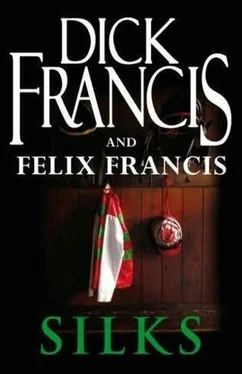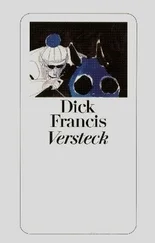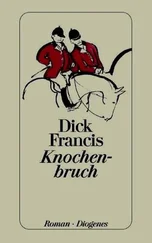Arthur looked at me with a questioning expression and I smiled back at him. Eventually, he turned on his heel and left me alone with my visitor. I stood up clumsily and held out my hand. George Barnett approached cautiously and briefly shook it.
‘Please sit down,’ I said to him, indicating the chair in front of my desk.
‘Did Trent do that?’ he asked, pointing at the cast that stretched from my left foot to my upper thigh.
‘No,’ I replied. ‘I had a fall.’
‘I had one of those last June,’ he said. ‘In my bathroom. Cracked my pelvis.’
‘Mine was from a horse,’ I said. ‘In a race.’
‘Oh,’ he said.
‘Smashed my knee,’ I said.
‘Oh,’ he said again.
I didn’t bother telling him about the cracked vertebrae, the broken ribs and the collapsed lung. Or the concussion that, seven weeks later, still plagued me with headaches.
We sat for a moment in silence while he looked around at the mass of papers and boxes that filled almost every available inch of space in my room.
‘Mr Barnett,’ I said, bringing his attention back to my face. ‘How can I help you?’
‘I thought it was me who needed to help you,’ he said.
‘Yes, indeed,’ I said, slightly surprised. ‘Yes, please. Would you like some coffee or tea?’
‘Tea would be lovely,’ he said. ‘Milk and one sugar.’
I lifted the phone on my desk and asked one of the junior clerks if he would be kind enough to fix it.
‘Now, Mr Barnett,’ I said. ‘Tell me everything.’
He was reluctant at first but he relaxed when the tea arrived, and the whole sorry story was spilled out.
‘I was initially pleased when I received the summons for jury service,’ he said. ‘I had been retired for about four years and I thought it would be interesting, you know, stimulating for the mind.’
‘What had you retired from?’ I asked him.
‘I was in the Civil Service,’ he said. I had been wrong about him having been a schoolmaster. ‘I was a permanent undersecretary in the Lord Chancellor’s Department, but it’s called something else now, Constitutional Affairs or something. They change everything, this government.’ It didn’t sound like he approved.
‘Had you done jury service before?’ I asked.
‘No,’ he said. ‘I was called once, years ago, but I was exempt through my work in the administration of justice. But they’ve changed the law on that now too. Even judges and the police now have to serve on juries if they are summoned.’
I knew. Lawyers used to be excluded too, but not any more.
‘So tell me what happened,’ I encouraged.
He looked around him as if about to tell a big secret that he didn’t want anyone else to overhear. ‘I turned up at the Old Bailey as I had been asked to and there were a whole load of us. We sat around for ages in the jury area. Then we were given a talk about being a juror and it was all rather exciting. We were made to feel important, if you know what I mean.’
I nodded. I suspected that, as a permanent under-secretary, he had indeed been quite important in the Civil Service but retirement had brought a return to anonymity. Like the headmasters of the great British public schools who may have princes and lords hanging on their every word while they are in post, only to be turned out to fairly low-paid pasture and obscurity on the day they depart. George Barnett would have enjoyed once again being made to feel important, as we all would.
‘In the end,’ he said. ‘I spent the whole of the first day sitting in the jury collection area reading the newspapers. When I was told I could go home, I was rather disappointed. But the following day I was selected for a trial. I remember being so excited by the prospect.’ He paused. ‘That was a mistake.’ He smiled ruefully at me.
‘The Trent trial?’ I said.
He nodded. ‘It was all right for a while,’ he said. ‘Then during the first weekend a man came to see me at home.’ He paused again. ‘He said he was from the jury service so I let him in.’
‘Did he give a name?’ I asked him.
‘Not at first,’ he said. ‘But then he said he was Julian Trent’s father, but I don’t think he actually was.’
‘Why not?’ I said.
‘I called him Mr Trent a couple of times and I didn’t think he realized I was talking to him.’
‘What did he say?’
‘Well, when he gave me that name I immediately told him to leave,’ he said. ‘I knew that we shouldn’t talk to anyone about the case, especially notto the defendant’s family. But he wouldn’t go away. Instead, he offered me money to vote not guilty.’
I sat quietly, waiting for him to continue.
‘I told him to go to hell,’ he said. ‘But…’ He tailed off, clearly distressed by the memory. I waited some more.
‘But he just sat there on a chair in my living room and looked around him. He said that I had a nice place and it would be a shame if I lost it all, or if my wife was injured in an accident.’ He stopped again. ‘I asked him what he meant. He just smiled and said to work it out.’
‘So did you vote not guilty?’ I asked.
‘My wife has Parkinson’s disease,’ he said. ‘And a bad heart.’ I assumed that meant yes, he had. ‘I knew that you only need ten of the twelve people on the jury to vote guilty in England to convict, so my vote wouldn’t really matter.’ I suppose he was trying to justify himself, and to excuse his behaviour. But he must surely have realized that the man would approach other jurors too.
‘So what happened in the jury room?’ I asked him. It was against the law for him to tell me and I could quite likely get disbarred for even just asking him, but what difference did one more misdemeanour matter, I thought. I could have been disbarred for lots of things I had done, or not done, recently.
‘There was a terrific row,’ he said. ‘Nine of them said straight away that they thought he was guilty as hell. There were three of us who didn’t.’ He stopped and looked up at the ceiling. ‘I think now that the man must have been to see all three of us. None of us could give any reason for saying he was not guilty. We just did. The others thought we were mad. One or two of them got really angry as the time dragged on and on.’
I remembered. I’d been really angry as well.
‘But you did return a guilty verdict in the end,’ I said.
‘I know,’ he said. ‘And it was me who had to say it in court as they had made me foreman right at the start. It was terrible.’
I remembered back a year, to the nervousness with which he had delivered the verdicts.
‘Who cracked?’ I said, trying to make light of the situation.
‘One of the other two,’ he said. ‘A woman. She did nothing for days and days but cry. It was enough to send anyone mad.’
I could imagine the emotions in that room. It had taken more than six days for one of the three to change their vote to guilty.
‘I was so relieved,’ he said. ‘I had often so nearly changed my vote, but every morning the man had called me and reminded me that my wife would have an accident if I didn’t stay firm. I just couldn’t believe that it went on for so long.’
Neither could I. I had fully expected the judge to declare a mistrial because the jury couldn’t make a decision. But he hadn’t. He had kept calling the jury back into court to ask them to try again to reach a verdict on which at least ten of them agreed. We would never know for how much longer he would have persevered.
‘So what happened afterwards?’ I asked him.
‘Nothing for ages, at least a month,’ he said. ‘Then the man turned up at my door and pushed me over when I tried to shut him out. He simply walked into the house and kicked me.’ It was clearly painful for him simply to describe it. ‘It was awful,’ he went on. ‘He kicked me twice in the stomach. I could hardly breathe. Then he went over to Molly, that’s my wife, and just tipped her out of her wheelchair onto the floor. I ask you, who could do such a thing.’ His eyes filled with tears but he choked them back. ‘Then he put his foot on her oxygen tube. It was absolutely horrid.’
Читать дальше












